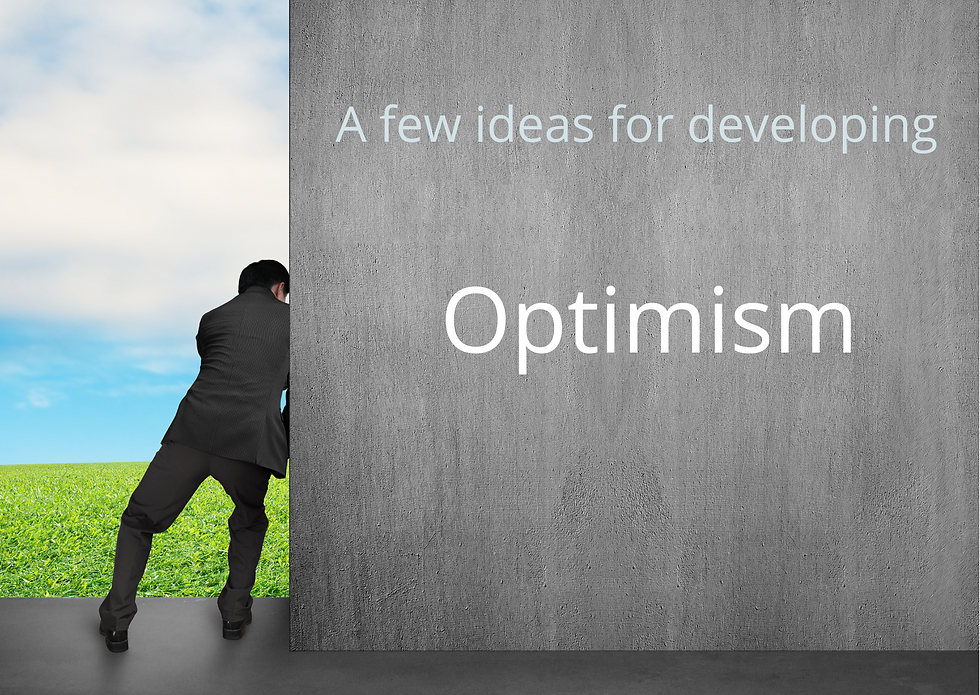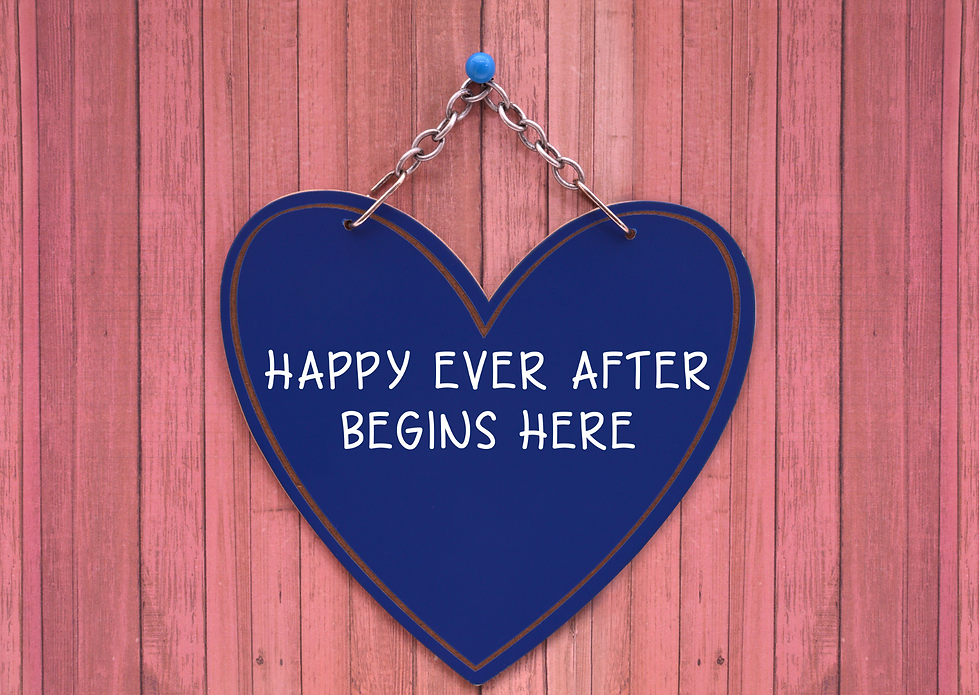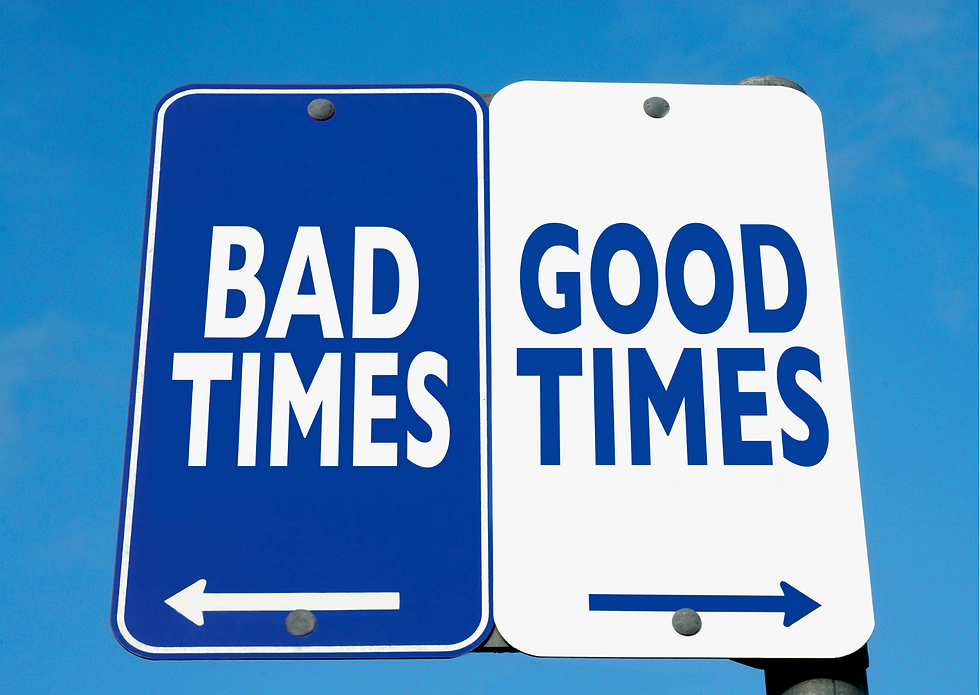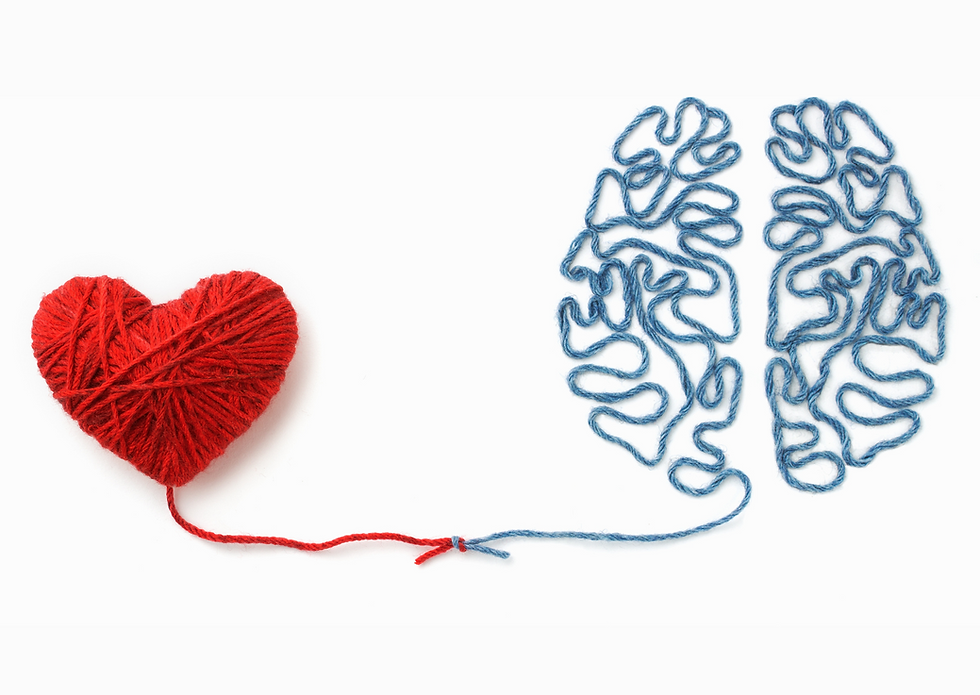Developing Optimism
- Mary Ely

- Oct 19, 2022
- 5 min read
RocheMartin defines Emotional Intelligence by a set of 10 competencies and this is one in a series of blogs covering each one.

Optimism is seeing the positive and finding the opportunity in every experience...which allows you to bounce back from the ones that haven't gone the way you wanted or expected!
The 3 components of Optimism are
Opportunity sensing
Always on the lookout for opportunities that can move you forward to your vision or that are in line with what is important to you.
Positive mood
Able to maintain a focus on the positive that creates and sustains a good mood and creates energy.
Resilience
The ability to bounce back quickly, fuelled by a belief that every experience is an opportunity to learn. Even the ones that don't go to plan or turn out as you hoped.
This allows you to maintain Self-Control, another emotional intelligence competency: whatever's happened, you can maintain focus on the task at hand rather than get swept away by any negative emotions like fear or disappointment.
To find out more and why it's so important, have a look at this blog.
A few ideas to increase your Optimism

Choose the yellow lenses!
There is no failure only feedback...and feedback is a gift!
Allow yourself to accept the nicer view
Change your explanatory style
Coaching
Choose the yellow lenses!
Neuroscience has shown that your brain changes based on what you focus on and the process is attributed to a bit of your brain called the Reticular Activating System (RAS). The RAS’s job is to alert you to things you need to pay attention to in the world and it’s based on where your focus is.
It’s like applying a filter to your experience - some things are brought into focus and some things are greyed out.

So if you want to focus on the brighter side of life, it's like choosing the right lenses for your sunglasses
If you wear grey-lense sunglasses, everything looks darker.
If you wear yellow-lense sunglasses, everything looks brighter.
...so if you consciously choose your filter, your experience of yourself, others and the world in general will change.

So why not
Switch to yellow-lense sunglasses,
go looking for the good stuff and you'll begin to see more of it!
There is no failure only feedback...and feedback is a gift!
This is a very useful belief to cultivate in your mind.
AND luckily, when you think about it, it's true! - as I explain in this blog.
Anticipating failure, or "things not turning out as you wanted, planned or hoped they would" is a key element of pessimism.
This belief however allows you to ditch the concept of failing and instead, believe that
WHATEVER happens is just an opportunity to get some feedback (a gift)
...which you get to review calmly and objectively and decide if it's useful or not
Useful?
What can you learn from the feedback?
What other options and opportunities does it open up for you to consider?
What will you experiment with to get a better result next time you're faced with something like this?
Not useful?
Ignore it.
Ditch the feedback, just like you would any other unwanted gift!

That will help you stop being pessimistic and make it easier to bounce back when you don't get the result you wanted.
In other words, it'll help you be more resilient, always be in a state to sense opportunities, stay positive and build your optimism!
Allow yourself to accept the nicer view
I used to be really good at pessimism and assuming that the (often) catastrophic future I was creating in my mind was the only version of reality that was going to play out.
And, if anyone suggested focusing on a more positive outcome, I would just assume they were being unrealistic, naive or recklessly giving in to false hope.
But when I did my emotional spring clean, and tackled fear and anxiety in my past, I learnt a different way of looking at things which helps me stick a spoke in that particular wheel if it starts to spin.
Perhaps it might work for you too:
Despite what you think, most of us don't have the power to actually see into the future. If you did, we'd all be sitting with our feet up, having won huge amounts of money on a horse race or two!
Also, if we could really directly influence and control all events by our thoughts and actions, it would be very odd if we chose to create our worst, rather than our best-case scenario!
So any future scenario or outcome we imagine actually only exists in our imagination
Assuming a best-case scenario won't make the worst-case scenario any more likely
Whatever we assume about the future, we're just making it up, but we're treating one option as if it’s real and the only option.
...so
as we're making it all up anyway, imagining the best-case scenario is an equally arbitrary choice as imagining the worst-case scenario, so why not choose to assume the best-case scenario?

Even if the worst-case scenario happens,
at least you won't have spent the time between now and then having a miserable time worrying about it
you'll have to deal with it anyway, and you'll be in a better state to do that if you haven't drained your mental energy with being in a stressed state between now and then
It's a bit like getting a cold. It's pretty likely that you'll pick up a cold sometime this year but most of us don't spend all year worrying about the next cold we're going to get.
...and how bad is the worst-case REALLY?!
Quite often, when you actually stop the panic running circles in your mind and talk it through...preferably with a coach who can prod you into considering a different perspective and stop the spinning in your head...you'll find that it's not that bad anyway.
It might not be pretty, pleasant or anywhere close to ideal, but it's surprising how quickly people find a way to let themselves know it'll be OK.
So why not
Focus on WHAT IS and not WHAT IF
And If you're going to assume a WHAT IF, make sure it's a nice one!
Change your explanatory style
...courtesy of Martin Seligman, a renowned positive psychologist.
Unsurprisingly (given the title), Martin Seligman's book "Learned Optimism: how to change your mind and your life" explains that optimism can indeed be learned and that the difference between whether you're an optimist or a pessimist is largely due to what he calls your explanatory style - how you explain the events that happen in your life.

Optimists:
when something good happens, they assume the good thing is
permanent - it's going to last
pervasive - it impacts all areas of their life, and
personal - whatever happened was down to them - who they are or what they did
when something bad happens, they think the opposite. That thing is
temporary - it'll pass
specific/contextual - it's impact is really limited
not down to them - who they are or what they did isn't the reason it happened.
...and unsurprisingly pessimists assume the exact opposite. They assume that
something good is temporary, specific/contextual and not down to them
something bad is permanent, pervasive and is down to them.
How can you develop the optimist's style?
Consider introducing a daily 'Pause for thought' as described in this blog to review the events of the day and simply apply the optimist's explanatory style to the things you've labelled as good and bad that have happened in your day.
Given that you get what you focus on, with repetition, this will gradually become your default setting.
Coaching
Coaching is by far the most efficient, effective, engaging, empowering and enjoyable way to build any of the Emotional Intelligence competencies.
Helping you to develop, refine and embed your own personalised strategies for each competency.

If you’re interested in understanding your level of emotional intelligence using one of the RocheMartin assessments or would like to explore coaching for developing components of it like Optimism, you can book a free call here.
And if you'd like to try out my monthly emails that provide a roundup of my blogs as well as other insights, you can sign up here.


Comments